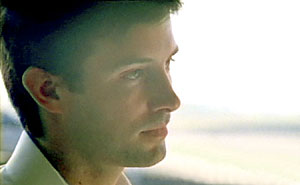 |
|
photo courtesy of thinkfilm
|
First-time director Shane Carruth builds a complex and intellectually stimulating time-travel story out of spare parts in "Primer." The film beat "Garden State" at Sundance and made Zach Braff more sulky and withdrawn than usual.
|
|
|
By Dan Shapiro
Arizona Daily Wildcat
Thursday, November 18, 2004
Print this
Shane Carruth directs, writes, produces, edits and acts in his debut film, "Primer," which is the story of four young men, ranging from scientist to software programmer, giving up their professional pursuits for hope of a better future.
The two main characters, Aaron and Abe, are increasingly involved in their new garage project, which is an unknown phenomenon to the pair. As the plot unravels, the two friends quickly discover the frightening reality that their new invention will transport them to.
The mystery of the film is engrossing because of the layered textures that the film produces upon first viewing. "Primer" is dirty and unrefined; with yellow filters the color of coffee-stained teeth, which gives the film a grimy appearance. This is contrasted with stark white film stock that looks so clean you could eat off it. The film is constantly battling itself with characters whom Carruth accentuates as chaotic yet professional and a camera that captures the scene with candid and subtle movements.
"Primer" is driven by tense and curt dialogue spoken by one or many people at the same time. The four friends constantly announce questions, sometimes just to talk over someone else, like, "Is platinum or palladium less resistant?" or, "What do they do with engineers when they turn 40?" These questions, apart from being mildly humorous to engineers, challenge the audience to pay attention and decipher the meaningful from the meaningless.
The humor, however, is not completely lost in the scientific jargon and having only a very elementary knowledge of workshop talk doesn't hinder the enjoyment of the film. "Primer" doesn't revolve around replacement transformers and oxygen tank capacities. Instead, the focus becomes very straightforward when you find that the electrically-charged box they have created produces a certain amount of fungus in days that would take years to produce in the real world.
The film's time travel is hard to follow at times, but it is particular to the movie and extremely interesting. Using the small box as a prototype, Aaron and Abe are able to recreate the phenomenon using larger rectangular enclosures, which are turned on ahead of time and then slept in. After awakening in the past, the friends buy stock that's about to triple and worry about the repercussions of violating the space-time continuum. They also begin to suffer from adverse side effects like bleeding ears and paranoia. As if on drugs, the two main characters become euphoric, their speech becomes less hurried and they turn introspective.
The discussions of morals, personal health and causality are what make this movie great. Aside from sci-fi, "Primer" focuses on two men spending time in a hotel the whole day or shutting their cell phones off from the world so they don't affect anything by time traveling. Carruth utilizes Aaron and Abe's dialogue to produce well thought-out subject material that is just as thrilling as it is thought-provoking.
By the end of the film, you've got a perfectly good epiphany trapped inside of an enigma wrapped in a mystery. The film's clever progression and unique take on time travel make the movie a must-see and not unlike "Garden State," which lost the Grand Jury Prize at Sundance to "Primer," is a worthy effort from a first-time filmmaker. I can only hope to see more from Carruth in the future.
